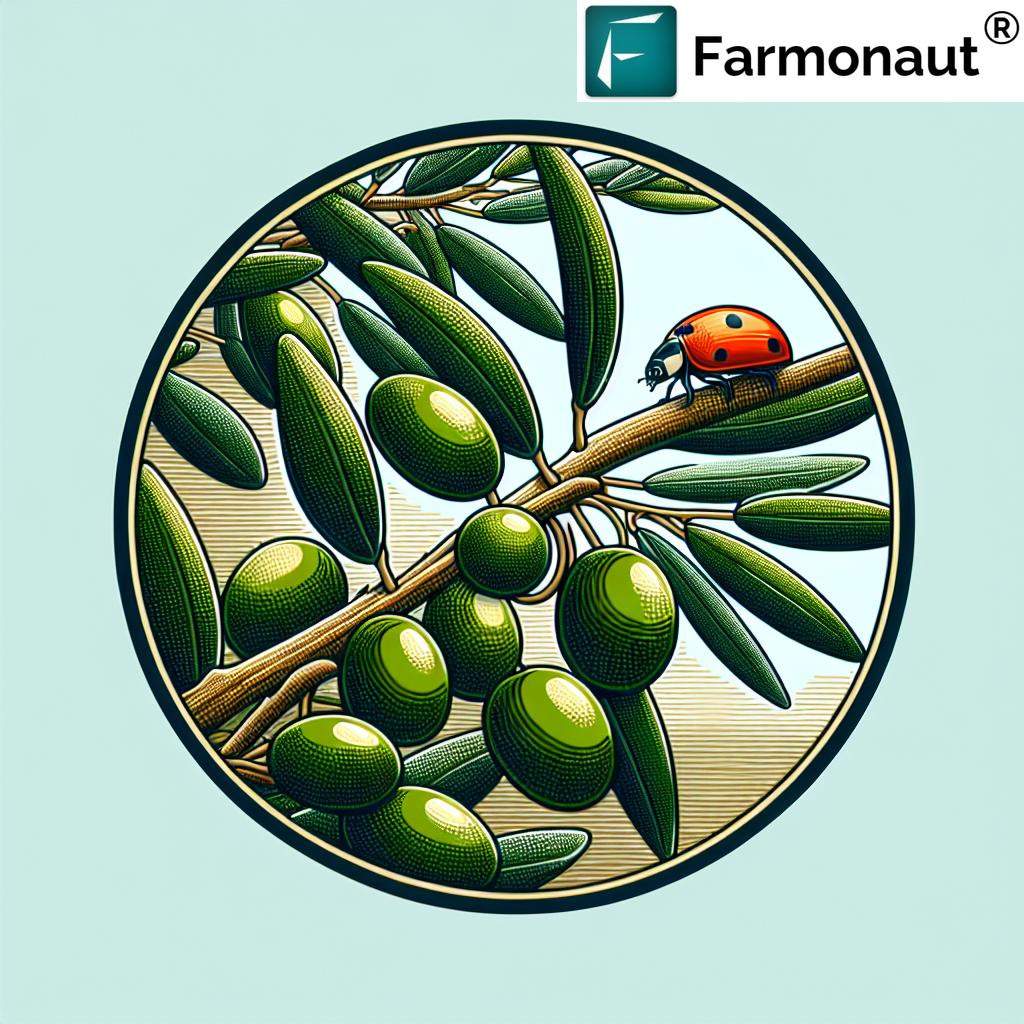Organic vs. Conventional: Effective Olive Pest Control Strategies for Protecting Your Fruit Crops

At Farmonaut, we understand the challenges faced by olive growers in protecting their valuable fruit crops from pests. In this comprehensive guide, we’ll explore both organic and conventional pest control methods, with a focus on sustainable practices that can help you maintain healthy olive trees and maximize your yield.
Understanding Olive Pests: A Closer Look
Before diving into control strategies, it’s crucial to understand the main pests that affect olive crops. The most significant threat to olive production worldwide is the olive fruit fly (Bactrocera oleae), but several other insects can also cause substantial damage.
The Olive Fruit Fly: A Formidable Foe
The olive fruit fly is a persistent pest that can cause severe damage to olive crops if left unchecked. Here’s what you need to know:
- Life Cycle: Adult female flies lay their eggs in ripening olives.
- Infestation: Once the eggs hatch, the larvae feed on the fruit pulp, causing significant damage.
- Impact: Infested olives may fall prematurely, reducing yield and oil quality.
Other Common Olive Pests
While the olive fruit fly is the primary concern, other pests can also pose threats to olive crops:
- Olive moth (Prays oleae)
- Black scale (Saissetia oleae)
- Olive psyllid (Euphyllura olivina)
Conventional Pest Control Methods
Conventional pest control typically involves the use of chemical treatments to manage insect populations. While effective, these methods can have drawbacks:
Chemical Insecticides
Chemical insecticides can provide rapid control of pest populations but should be used judiciously:
- Pros: Fast-acting, broad-spectrum control
- Cons: Potential environmental impacts, risk of pest resistance, harm to beneficial insects
Bait Sprays
Bait sprays combine insecticides with attractants to target specific pests:
- Pros: More targeted than broad-spectrum sprays, can reduce overall pesticide use
- Cons: May still impact non-target organisms, requires precise timing and application
Organic Pest Control Strategies
At Farmonaut, we advocate for organic and sustainable pest control methods whenever possible. These approaches can be highly effective when implemented correctly:
Cultural Controls
Cultural controls focus on creating an environment that’s less favorable for pests:
- Proper pruning to improve air circulation
- Maintaining tree health through appropriate irrigation and fertilization
- Early harvesting to reduce exposure to late-season pests
Biological Controls
Biological controls leverage natural predators and parasites to manage pest populations:
- Releasing beneficial insects like parasitic wasps
- Encouraging native predators through habitat management
- Using microbial insecticides like Bacillus thuringiensis (Bt)
Trapping and Monitoring
Effective monitoring is crucial for timely intervention:
- Pheromone traps to monitor adult fly populations
- Yellow sticky traps for visual monitoring
- Regular orchard inspections to assess fruit damage
Organic Sprays and Repellents
Several organic products can help deter or control olive pests:
- Kaolin clay sprays to create a protective barrier on fruits
- Neem oil as a natural insecticide and repellent
- Spinosad-based products for targeted control of fruit flies
Integrated Pest Management: The Best of Both Worlds
At Farmonaut, we believe that the most effective approach to olive pest control is Integrated Pest Management (IPM). This strategy combines the best elements of both conventional and organic methods:
- Regular monitoring and early detection of pest issues
- Use of economic thresholds to determine when intervention is necessary
- Prioritizing cultural and biological controls
- Judicious use of chemical controls only when absolutely necessary
Farmonaut’s Role in Olive Pest Management
Our advanced satellite-based monitoring system can play a crucial role in your olive pest management strategy:
- Early Detection: Our satellite imagery can help identify stress patterns in your olive groves that may indicate pest infestation.
- Targeted Intervention: By pinpointing problem areas, we help you focus your pest control efforts where they’re needed most.
- Reduced Chemical Use: With more precise monitoring, you can minimize the use of chemical treatments, supporting a more organic approach.
To learn more about how Farmonaut can support your olive pest management efforts, visit our app or explore our API documentation.
Comparison: Organic vs. Conventional Olive Pest Control
| Aspect | Traditional Scouting | Farmonaut’s Satellite Monitoring | Chemical Treatments | Organic Solutions |
|---|---|---|---|---|
| Pest Detection Methods | Visual inspection, traps | Satellite imagery analysis, AI-driven stress detection | Often reactive, based on visible damage | Proactive monitoring, traps, natural indicators |
| Treatment Options | Varied, often chemical-based | Supports targeted organic and conventional interventions | Synthetic pesticides, broad-spectrum applications | Biological controls, organic sprays, cultural practices |
| Environmental Impact | Moderate to high, depending on methods used | Low, supports reduced chemical use | Potentially high, risks to non-target organisms | Low, promotes ecosystem balance |
Best Practices for Olive Pest Control
To effectively manage olive pests while minimizing environmental impact, consider the following best practices:
- Regular Monitoring: Use a combination of traditional scouting and advanced technologies like Farmonaut’s satellite monitoring to stay ahead of pest issues.
- Proper Timing: Time your interventions based on pest life cycles and local conditions for maximum effectiveness.
- Diversity in Approach: Implement a variety of control methods to reduce the risk of pest resistance.
- Preservation of Beneficial Insects: Choose pest control methods that minimize harm to pollinators and natural predators.
- Record Keeping: Maintain detailed records of pest populations, treatments, and results to inform future management decisions.
The Future of Olive Pest Control
As we look to the future, several promising developments are on the horizon for olive pest management:
- Precision Agriculture: Advanced technologies like Farmonaut’s satellite monitoring will enable increasingly targeted and efficient pest control strategies.
- Genetic Research: Development of pest-resistant olive varieties may reduce the need for intensive pest management.
- Biocontrol Advancements: Ongoing research into new biological control agents may provide more effective organic pest control options.
- Climate-Adaptive Strategies: As climate change affects pest populations and distributions, adaptive management strategies will become increasingly important.
Case Study: Successful Organic Olive Pest Management
To illustrate the effectiveness of organic pest control methods, let’s examine a hypothetical case study:
An olive grove in southern Spain implemented a comprehensive organic pest management program with the help of Farmonaut’s monitoring technology. The growers:
- Used satellite monitoring to identify early signs of stress in their trees
- Implemented a rigorous trapping and monitoring program for olive fruit flies
- Applied kaolin clay sprays to deter pest infestations
- Released beneficial insects to control pest populations naturally
- Practiced careful pruning and irrigation management to promote tree health
Results after two growing seasons:
- 50% reduction in olive fruit fly infestations
- 30% decrease in overall pest-related crop losses
- Improved olive oil quality due to reduced pest damage
- Increased biodiversity in the olive grove ecosystem
This case study demonstrates that with the right approach and tools, organic pest management can be highly effective in olive production.
Farmonaut’s Commitment to Sustainable Olive Production
At Farmonaut, we’re dedicated to supporting olive growers in their pursuit of sustainable and effective pest management strategies. Our advanced satellite monitoring technology provides valuable insights that can enhance both organic and conventional pest control efforts.
By leveraging our services, olive growers can:
- Detect pest-related stress early, before significant damage occurs
- Implement targeted interventions, reducing the need for broad-spectrum treatments
- Monitor the effectiveness of pest control measures in real-time
- Make data-driven decisions to optimize their pest management strategies
To learn more about how Farmonaut can support your olive pest management efforts, explore our Android app or iOS app.
FAQ: Olive Pest Control
Q: What is the most effective organic method for controlling olive fruit flies?
A: A combination of trapping, monitoring, and the use of kaolin clay sprays has shown to be highly effective in organic olive fruit fly control.
Q: How often should I monitor my olive trees for pests?
A: Regular monitoring is crucial. We recommend weekly visual inspections during the growing season, complemented by continuous satellite monitoring through Farmonaut’s services.
Q: Can I completely eliminate the use of chemical pesticides in olive production?
A: While it’s challenging to eliminate chemical pesticides entirely, many growers have successfully transitioned to predominantly organic methods with minimal chemical interventions.
Q: How does climate change affect olive pests?
A: Climate change can alter pest life cycles, distribution, and population dynamics. It may lead to new pest pressures and changes in the effectiveness of current control methods.
Q: What role does pruning play in pest control?
A: Proper pruning improves air circulation and light penetration in the canopy, creating less favorable conditions for pests and diseases.
Conclusion: A Balanced Approach to Olive Pest Control
Effective olive pest management requires a balanced approach that considers both the immediate need for pest control and the long-term health of your olive grove ecosystem. By combining organic methods, judicious use of conventional treatments when necessary, and advanced monitoring technologies like those offered by Farmonaut, olive growers can achieve robust pest control while minimizing environmental impact.
Remember, the key to successful pest management lies in:
- Early detection through regular monitoring and advanced technologies
- Implementing a diverse range of control strategies
- Prioritizing ecosystem health and biodiversity
- Staying informed about the latest research and best practices
By adopting these principles and leveraging the power of precision agriculture, we can work together to ensure the sustainability and productivity of olive groves for generations to come.
To start optimizing your olive pest management strategy with Farmonaut’s advanced satellite monitoring, subscribe to our services today:
For more information on our API services and how they can be integrated into your existing farm management systems, visit our API documentation.

Together, we can cultivate healthier, more resilient olive groves while preserving the delicate balance of our agricultural ecosystems. Join us in the journey towards sustainable olive production!